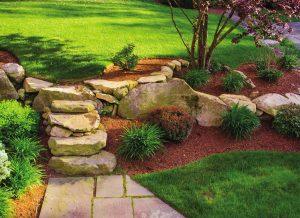 Nearly every gardener or landscaper will tell you that mulch is a worthy component to include in any garden or landscaping, but why is mulch used, and what is it exactly? Simply put, it is any material that covers soil. For practical use, mulch is great for keeping the soil moist. Additionally, it can help prevent the growth of weeds, moderate the soil’s temperature, prevent soil erosion, and of course spruce up the appearance of your garden or landscaping. Knowing the pros and cons of different types of mulch will help you choose the best option for you and help you be prepared to face any issues that may arise.
Nearly every gardener or landscaper will tell you that mulch is a worthy component to include in any garden or landscaping, but why is mulch used, and what is it exactly? Simply put, it is any material that covers soil. For practical use, mulch is great for keeping the soil moist. Additionally, it can help prevent the growth of weeds, moderate the soil’s temperature, prevent soil erosion, and of course spruce up the appearance of your garden or landscaping. Knowing the pros and cons of different types of mulch will help you choose the best option for you and help you be prepared to face any issues that may arise.
Before hearing about all of the options available, you must understand that all mulches fall into one of two categories: organic or inorganic. Organic mulch is made from materials that were once alive, such as wood or grass, while inorganic mulch is made from materials that were never alive, such as stones or rubber. In terms of lifespan, organic mulch should be replaced around every three years while inorganic mulch can last a little longer. Both have many benefits, and there are several options in each category. If you are looking to choose the perfect mulch for your next landscaping or gardening project, here are a few popular kinds that you should consider.
Shredded Wood or Bark Mulch
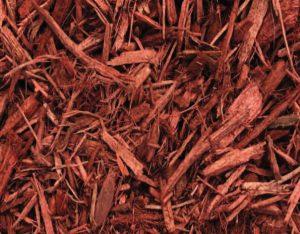 Shredded wood mulch and bark mulch are the two most common wood mulch options. An inexpensive option, shredded mulch is comprised of smaller pieces of shredded wood, which are sometimes dyed colors, such as red or black, simply for aesthetic purposes. Typically, the kinds of wood used to create this mulch are not disclosed, but the wood is often sourced from the lumber and paper industries. Due to the natural breakdown process, shredded wood mulch will require raking from time to time to maintain its appearance and prevent clusters from forming.
Shredded wood mulch and bark mulch are the two most common wood mulch options. An inexpensive option, shredded mulch is comprised of smaller pieces of shredded wood, which are sometimes dyed colors, such as red or black, simply for aesthetic purposes. Typically, the kinds of wood used to create this mulch are not disclosed, but the wood is often sourced from the lumber and paper industries. Due to the natural breakdown process, shredded wood mulch will require raking from time to time to maintain its appearance and prevent clusters from forming.
 Just like the name suggests, bark mulch comes from tree bark. Unlike shredded wood mulch, bark mulch comes from freshly cut trees and is not usually dyed. The larger chips of wood that make up bark mulch may float away in the rain; therefore, they could need replacing more often than their smaller competitors. However, they do not break down as quickly as shredded wood mulch does. Additionally, this kind of mulch is similarly priced as shredded wood. Bark mulch can be made from one or several different types of wood.
Just like the name suggests, bark mulch comes from tree bark. Unlike shredded wood mulch, bark mulch comes from freshly cut trees and is not usually dyed. The larger chips of wood that make up bark mulch may float away in the rain; therefore, they could need replacing more often than their smaller competitors. However, they do not break down as quickly as shredded wood mulch does. Additionally, this kind of mulch is similarly priced as shredded wood. Bark mulch can be made from one or several different types of wood.
Composted Leaves
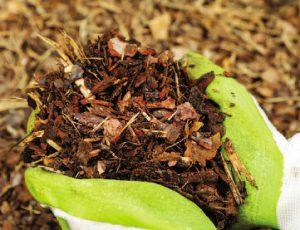 Just like wood, this is an organic mulch option. Composted leaves incorporate, as the name suggests, leaves as well as grass. If you are looking to make mulch yourself, this type can be made from leaves in your yard, grass, and even greens from your kitchen. Compost is one of the most nutritious options for soil, and if you do not want to make it yourself, a garden center should have it. There are other types of compost mulch to consider as well, but please note that this type of mulch breaks down the fastest of any mulch, which means that it will likely need to be replaced sooner than other options would. Because this is an option you can make yourself, the cost ranges from entirely free to relatively inexpensive. Some municipalities simply give it away.
Just like wood, this is an organic mulch option. Composted leaves incorporate, as the name suggests, leaves as well as grass. If you are looking to make mulch yourself, this type can be made from leaves in your yard, grass, and even greens from your kitchen. Compost is one of the most nutritious options for soil, and if you do not want to make it yourself, a garden center should have it. There are other types of compost mulch to consider as well, but please note that this type of mulch breaks down the fastest of any mulch, which means that it will likely need to be replaced sooner than other options would. Because this is an option you can make yourself, the cost ranges from entirely free to relatively inexpensive. Some municipalities simply give it away.
Straw
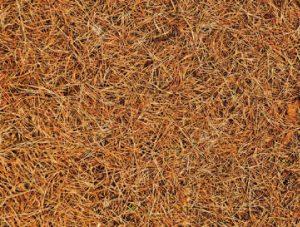 This golden mulch is visually appealing and will look lovely in any garden. Straw mulch can come in a variety of sizes and is typically used in vegetable gardens because it provides a good barrier between mud and the produce. Although it is more commonly used in utilitarian settings, such as a produce garden, it is still a great option for your general landscaping considering that it does not break down as quickly as compost. With this option, you may see a few more weeds than you would with bark mulch, for example, so you have to keep an eye out for unwanted seedlings.
This golden mulch is visually appealing and will look lovely in any garden. Straw mulch can come in a variety of sizes and is typically used in vegetable gardens because it provides a good barrier between mud and the produce. Although it is more commonly used in utilitarian settings, such as a produce garden, it is still a great option for your general landscaping considering that it does not break down as quickly as compost. With this option, you may see a few more weeds than you would with bark mulch, for example, so you have to keep an eye out for unwanted seedlings.
Stone
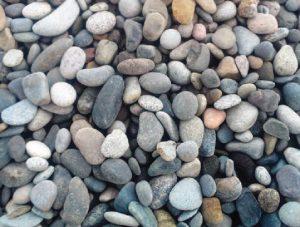 Moving on to inorganic options, stone is a decorative natural mulch. It does get quite hot, so you have to be careful where you place it to avoid harming your plants or produce. A potential option for this type of mulch is to lay it in a succulent garden. If you place a landscaping fabric underneath the stones, you will never have to worry about weeds. On top of that, stone does not break down like organic mulches do. This means that it will not need to be replaced nearly as often as the other mulches would. On the downside, stone provides no nutrients to the soil as an organic option would.
Moving on to inorganic options, stone is a decorative natural mulch. It does get quite hot, so you have to be careful where you place it to avoid harming your plants or produce. A potential option for this type of mulch is to lay it in a succulent garden. If you place a landscaping fabric underneath the stones, you will never have to worry about weeds. On top of that, stone does not break down like organic mulches do. This means that it will not need to be replaced nearly as often as the other mulches would. On the downside, stone provides no nutrients to the soil as an organic option would.
Rubber Mulch
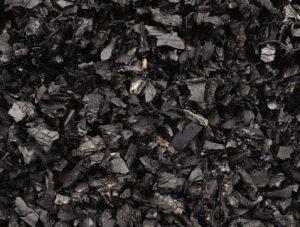 Of all the mulch options on this list, rubber mulch, made from recycled tires and resembling wood, is the only non-biodegradable option. It also does not provide nutrients to the soil and is flammable, but when you look past those negative aspects, there are quite a few positives. Rubber mulch insulates the soil, protecting it from heat and harsh weather. It also resists compression, meaning that it is unlikely to blow or float away. This option is more expensive than wood, compost, and straw, but it lasts longer and does not need to be replaced as often.
Of all the mulch options on this list, rubber mulch, made from recycled tires and resembling wood, is the only non-biodegradable option. It also does not provide nutrients to the soil and is flammable, but when you look past those negative aspects, there are quite a few positives. Rubber mulch insulates the soil, protecting it from heat and harsh weather. It also resists compression, meaning that it is unlikely to blow or float away. This option is more expensive than wood, compost, and straw, but it lasts longer and does not need to be replaced as often.
Mulch is a great addition to your landscaping or garden for many reasons and comes in several options. Use mulch to level up your outdoor space and match it to your own aesthetic. Contact a landscaping professional for help designing your yard and choosing the right mulch for you. If you are concerned about your pet being too curious about the mulch you use, talk with your veterinarian about the best options for you. Depending on your tastes and needs, one of these mulches might spruce up your yard soon! ![]()
Emily Schutz
Home & Yard Magazine




